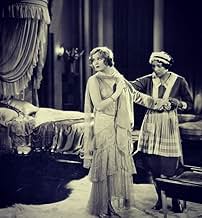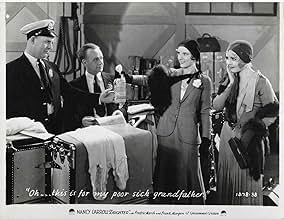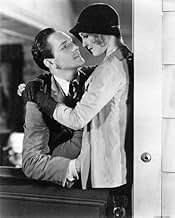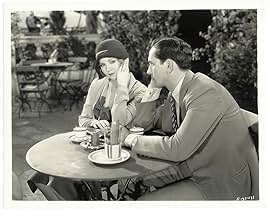Adicionar um enredo no seu idiomaA former chorus girl weds a millionaire after the composer she loves leaves. Meanwhile, she strings along an artist in love with her. When the composer returns, she struggles with her needs ... Ler tudoA former chorus girl weds a millionaire after the composer she loves leaves. Meanwhile, she strings along an artist in love with her. When the composer returns, she struggles with her needs for security vs love. High jinks and drama ensue.A former chorus girl weds a millionaire after the composer she loves leaves. Meanwhile, she strings along an artist in love with her. When the composer returns, she struggles with her needs for security vs love. High jinks and drama ensue.
- Direção
- Roteiristas
- Artistas
- Indicado a 1 Oscar
- 3 vitórias e 1 indicação no total
Eric Blore
- Party Guest in Angel Costume
- (não creditado)
Charles Halton
- Winslow - Gibson's Secretary
- (não creditado)
Duncan Penwarden
- Mr. Miller
- (não creditado)
Avaliações em destaque
... or make a wise decision concerning your future for that matter. The life of ex-chorus girl Peggy (Nancy Carroll) now socialite wife to public utilities king C. Morton Gibson (Frank Morgan) seems to be an object lesson in this fact. Peggy is already a millionaire's wife by the time the film opens, so we don't see any of her past life, just the human remnants of it. First there's Ralph, an overwrought starving artist who is obsessed with memories of Peggy but whom Peggy never apparently loved. Next there's Paul Lockridge (Fredric March), starving musician, whom Peggy did love but was overseas at the time she made the decision to marry Gibson, and thus could not plead his case.
Peggy doesn't have to worry about being hungry anymore, in fact she doesn't have to worry about anything in her new life. However, her husband treats her like a cross between a bird in a gilded cage and a welfare case, always talking about her "unfortunate past" and scrutinizing her every unexplained absence. Neither is he a particularly passionate fellow - accumulating more and more cash is his real passion. The lack of joy in Peggy's life comes to the surface when Paul returns from Europe to win her back. His only asset - laughter, the joy of life lived experience by experience. Add to this a chance meeting of Peggy's unstable old suitor, Ralph, with Peggy's new stepdaughter, Marjorie, that turns romantic and complications abound.
This is a rather understated film, nothing is particularly laugh-out-loud funny or horribly suspenseful and melodramatic save for a couple of short scenes in each case. Thus the film's success largely rests on the acting of the performers, which is quite good. Since this film was made in 1930, many might think it is about the desperate decisions and trade-offs people had to make to keep eating during those times, but it really predates the depression.
This is a good one for fans of Nancy Carroll, who plays her understated role very well - that of a decent woman whose profession of chorus girl guarantees not only that she has just a few good years to make a decision on the only profession that could come afterwards for such women in the 1920's - marrying well, but that everyone automatically doubts her character because of her profession.
Peggy doesn't have to worry about being hungry anymore, in fact she doesn't have to worry about anything in her new life. However, her husband treats her like a cross between a bird in a gilded cage and a welfare case, always talking about her "unfortunate past" and scrutinizing her every unexplained absence. Neither is he a particularly passionate fellow - accumulating more and more cash is his real passion. The lack of joy in Peggy's life comes to the surface when Paul returns from Europe to win her back. His only asset - laughter, the joy of life lived experience by experience. Add to this a chance meeting of Peggy's unstable old suitor, Ralph, with Peggy's new stepdaughter, Marjorie, that turns romantic and complications abound.
This is a rather understated film, nothing is particularly laugh-out-loud funny or horribly suspenseful and melodramatic save for a couple of short scenes in each case. Thus the film's success largely rests on the acting of the performers, which is quite good. Since this film was made in 1930, many might think it is about the desperate decisions and trade-offs people had to make to keep eating during those times, but it really predates the depression.
This is a good one for fans of Nancy Carroll, who plays her understated role very well - that of a decent woman whose profession of chorus girl guarantees not only that she has just a few good years to make a decision on the only profession that could come afterwards for such women in the 1920's - marrying well, but that everyone automatically doubts her character because of her profession.
I was expecting this movie to be much more than it was. I read that it was one of Fredric March's personal favorites, his others being A Star is Born, Death Takes a Holiday, and Best Years of Our Lives, and so since he liked it I thought it was going to be really good. I must say I was really bored with it. The story seemed boring and not really well written. I think it could have been a much better story if the script was better. As is, there were too many loose ends. Sure, there were some funny moments (it was enjoyable to see Fred draped in a white bearskin rug!), and Fred gave a few kisses, and you got to see him in his undershirt. But I have seen him in MUCH better roles, more romantic, more funny...everyone's opinion is different. This is mine...It is one of the few Fred movies I didn't really like.
Ha ha. Nice line from Fredric March (Paul) who plays a musician who is in love with chorus girl Nancy Carroll (Peggy). However, she has married wealthy bore Frank Morgan (Mr Gibson). She has wealth but no laughter in her life which is what March returns to see her about. But there is also someone else on the scene - artist Glenn Anders (Ralph). This side of the story is pretty heavy-going and throws in some real drama to the proceedings.
The side story with Anders takes you down a route that you don't expect in a comedy but it has pivotal significance for the character of Nancy. The acting is good from all and March and Carroll have a good chemistry and carefree attitude which comes across well. There are several funny scenes, eg, when the two lovebirds break into a stranger's house, the piano sequence with March and the butler Leonard Carey and the spontaneous dancing from Carroll and Morgan's daughter Diane Ellis (Marjorie) to name a few. This was to be the last film made by Ellis who died at age 20 whilst on honeymoon in India.
Finally, I can't wait to start calling people from Hell.
The side story with Anders takes you down a route that you don't expect in a comedy but it has pivotal significance for the character of Nancy. The acting is good from all and March and Carroll have a good chemistry and carefree attitude which comes across well. There are several funny scenes, eg, when the two lovebirds break into a stranger's house, the piano sequence with March and the butler Leonard Carey and the spontaneous dancing from Carroll and Morgan's daughter Diane Ellis (Marjorie) to name a few. This was to be the last film made by Ellis who died at age 20 whilst on honeymoon in India.
Finally, I can't wait to start calling people from Hell.
"Laughter" is a glorious romantic comedy with a terrific cast including that great man of the screen, Fredric March. It concerns a young woman who has married for stability and wealth, but can't forget the love of her life, played by the delicious Mr March. It was made at Paramount's Long Island studios, and some scenes were shot on location in New York, giving the movie a different "look" to many others of the period. Some people think of this movie as the first "Screwball" comedy. "Laughter" was Frank Morgan's first talkie and the last movie for Diane Ellis who plays his daughter. She died on her honeymoon in December 1930.
I watched LAUGHTER, a 1930 film starring Nancy Carroll and Fredric March. Many comments and reviews state this film as a forerunner of the 30s screwball comedy. Yes there were some screwball elements, such as the silly sequence when the stars, caught in the rain, break into a house and put on bear rugs while their clothes dry. There's also a terrific scene when March is playing piano when the butler (Leonard Carey) tries to correct him. They end up playing duets! There's also a nice party scene where Eric Blore shows up in an angel costume. Another standout scene is when the daughter (Diane Ellis) starts to jazz dance and is joined by Carroll while Frank Morgan sourly looks on. Also of interest is Pearl the maid, played by Ollie Burgoyne, who was better known as Olga Burgoyne, a dancer in many stage shows.
Still, I don't see this film as a comedy, let alone a screwball comedy. Carroll (she's very good) plays a former show girl who marries Morgan for his money. His daughter is only a little younger than Carroll. The daughter is a little wild; Carroll is a lot bored. She has everything in her life but "laughter." When she takes up with March, we know the marriage is doomed. So does everyone else.
Morgan's character hasn't an ounce of humor in him. There's also a tragic starving artist type (Glenn Anders) who gets involved with Ellis. It's with this character that any shred of comedy drains from the picture as doom settles over the storyline.
This is still a very good film with solid work from its stars.
Still, I don't see this film as a comedy, let alone a screwball comedy. Carroll (she's very good) plays a former show girl who marries Morgan for his money. His daughter is only a little younger than Carroll. The daughter is a little wild; Carroll is a lot bored. She has everything in her life but "laughter." When she takes up with March, we know the marriage is doomed. So does everyone else.
Morgan's character hasn't an ounce of humor in him. There's also a tragic starving artist type (Glenn Anders) who gets involved with Ellis. It's with this character that any shred of comedy drains from the picture as doom settles over the storyline.
This is still a very good film with solid work from its stars.
Você sabia?
- CuriosidadesOrson Welles cast scene-stealing character-actor Glenn Anders in The Lady From Shanghai because he had remembered how good he was in this film.
- ConexõesAlternate-language version of A Mulher Que Ri (1931)
- Trilhas sonorasLittle Did I Know
by Irving Kahal, Pierre Norman and Sammy Fain
Principais escolhas
Faça login para avaliar e ver a lista de recomendações personalizadas
Detalhes
- Tempo de duração1 hora 25 minutos
- Cor
- Proporção
- 1.20 : 1
Contribua para esta página
Sugerir uma alteração ou adicionar conteúdo ausente

Principal brecha
By what name was O Melhor da Vida (1930) officially released in Canada in English?
Responda





























